
A professor in the Department of Linguistics has been selected for not only the 2025 LAS Award for in Excellence in Undergraduate Teaching, but also for the campus level award: the 2025 Campus Award for Excellence in Undergraduate Teaching.
Eman Saadah is a teaching associate professor who has become known for dedication that transcends the classroom as she organizes cooking classes, conversation sessions, and other co-curricular activities.
“She emphasizes the importance of considering diverse cultural contexts when learning a language, encouraging students to engage with different viewpoints and perspectives,” wrote a student who graduated in 2020.
The Campus Award for Excellence in Undergraduate Teaching is given based on sustained excellence in undergraduate teaching; innovative approaches to undergraduate teaching; overall positive impact on undergraduate student learning; demonstrated commitment to diversity, equity and inclusion; and other contributions to improve undergraduate instruction.
We recently caught up with Saadah and spoke with her about her role.
Can you describe your work within the school?
I currently serve as the advisor for the interdisciplinary minor in Arabic studies and director of the Arabic program, the Less Commonly Taught Languages (LCTL) program, and the Summer Institute of Languages of the Muslim World (SILMW) program.
What impact do you hope to have on your students and department?
I create opportunities for students to experience Arabic in the real-world without necessitating a study abroad experience. For example, I accomplished this by coaching and preparing students to participate in multiple rounds of the U.S. Universities Arabic Debating Championship. By creating such experiences outside of the university, my students are able to see real-world applications of their coursework and become further engaged with content when learning.
At the level of the department, I mentor and supervise many faculty, TAs, and GAs for the LCTL programs. I oversee multiple languages, supervise staff, coordinate individual language programs, and standardize the process for offering new language courses.
What do you enjoy most about your role?
Seeing my students succeed and thrive in their lives and careers after graduation brings me great joy. I especially enjoy receiving update emails or letters sharing what they are up to and how they have been doing. As an academic, I take great joy in my students' numerous successes, which highlight the transformative impact of my teaching. Many who began learning Arabic as novices have progressed to achieve advanced proficiency.
What’s your proudest achievement?
Seeing my students successfully compete at the national level for prestigious awards and secure highly competitive scholarships, such as the Critical Language Scholarship and the Boren Award, to study abroad in Arab countries is incredibly rewarding. Even more fulfilling is having wonderful conversations with them in Arabic, where they share fun stories and memorable moments from their journey to becoming more proficient speakers.
Anything else you’d like to add?
I have successfully delivered quality teaching and pedagogy for many courses, creating many face-to-face, online and hybrid courses. I have made significant contributions to the field, inspiring educators to update their approaches to teaching and sharing materials to support this effort. My leadership of the SILMW program for more than a decade has ensured the continuity of language instruction into the summer, allowing students to begin or advance their studies. Over the past nine years, we have also expanded to include high school students. To support these programs and others, I have secured numerous external and internal grants to establish and sustain educational initiatives, enhancing both my teaching and that of others. My network of LCTL and Arabic teaching faculty has grown significantly, and I am now recognized as one of the notable names in the field.